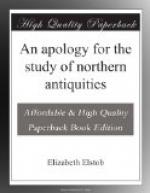The Author of the Proposal, may think this but an ill Return, for the soft things he has said of the Ladies, but I think it Gratitude at least to make the Return, by doing Justice to the Gentlemen. I will not contradict the Relation of the ingenious Experiment of his vocal Ladies, tho’ I could give him some Instances to the contrary, in my Experience of those, whose Writings abound with Consonants; where Vowels must generally be understood, and appear but very rarely. Perhaps that Gentleman may be told that I have a Northern Correspondence, and a Northern Ear, probably not so fine as he may think his own to be, yet a little musical.
And now for our Monosyllables. In the Controversy concerning which, it must be examined, first whether the Charge which is exhibited against the Northern Languages is true, that they consist of nothing but Monosyllables; and secondly, whether or no the Copiousness and Variety of Monosyllables may be always justly reputed a fault, and may not sometimes as justly be thought, to be very useful and ornamental.
And first I must assert, that the ancient Northern Languages, do not wholly nor mostly consist of Monosyllables. I speak chiefly of the Gothick, Saxon, and Teutonick. It must be confest that in the Saxon, there are many Primitive Words of one Syllable, and this to those who know the Esteem that is due to Simplicity and Plainness, in any Language, will rather be judged a Virtue than a Vice: That is, that the first Notions of things should be exprest in the plainest and simplest manner, and in the least compass: and the Qualities and Relations, by suitable Additions, and Composition of Primitive Words[D]; for which the Saxon Language is very remarkable, as has been before observed, and of which there are numerous Examples, in the following Treatise of Saxon Grammar, and infinitely more might have been added.
[Footnote D: Of this the Greeks
give as a fair Example, when
they express the Original
and Author of all Things, their +Pate:r
andro:nte theo:nte+, by their
Monosyllable +Zeus+. As the Hebrews
do by ++yah++, the Goths
the Ancestors of our Saxon Progenitors
by the Word ++GO[TH]++, the
Saxons, old Germans, Teutons,
Francick, and English,
in the Monosyllable Go[dh], the
Germans #Gott#, and
the French Dieu.]
The second Enquiry is, whether or no the Copiousness and Variety of Monosyllables may be always justly reputed a fault, and may not as justly be thought, to be very useful and ornamental? Were this a fault, it might as justly be charged upon the learned Languages, the Latin and Greek: For the Latin you have in Lilly’s Rules concerning Nouns, several Verses, made up for




